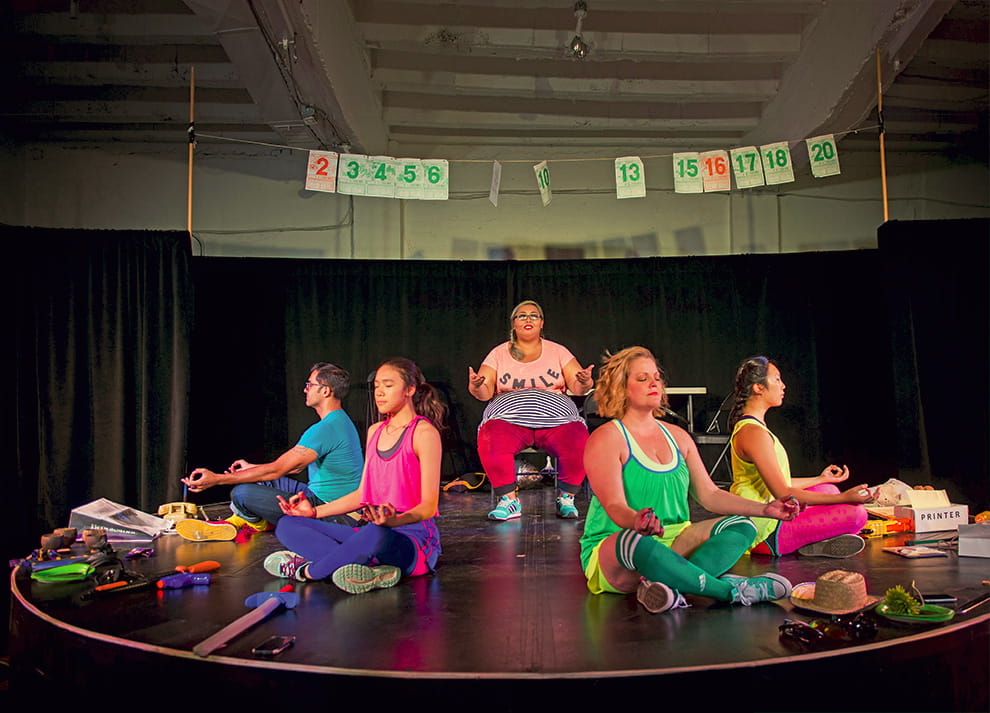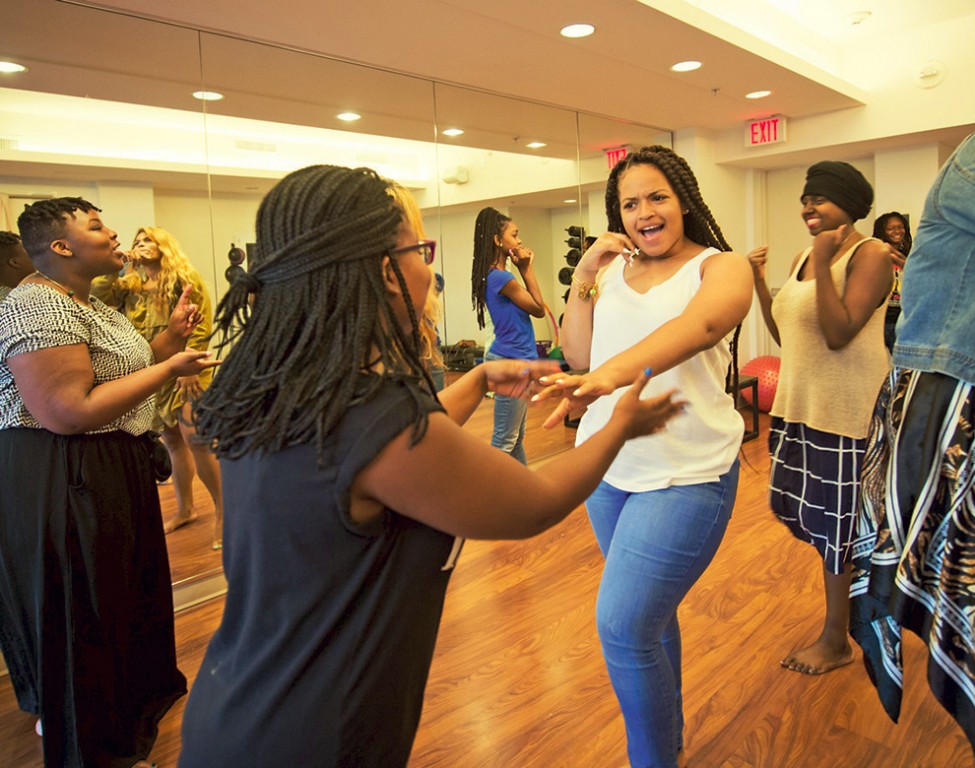Stories > Connecting Communities Through Play
Connecting Communities Through Play
MELISSA SIM, artistic director of theatre company How Drama, talks about the role of the arts in drawing Singaporean and American communities closer through its production, Fat Kids Are Harder To Kidnap.
PHOTOS TRACI J. BROOKS STUDIOS
ILLUSTRATION THAM SZEMIN

The cast for the US staging of Fat Kids Are Harder To Kidnap is multi-ethnic and multinational.
ow Drama, a Singapore-based theatre company founded in 2007, has always endeavoured to draw young people to the theatre and effect positive change in communities through the arts. Our play, Fat Kids Are Harder To Kidnap, is our main production.
In 2016, we took Fat Kids to the United States as part of the Capital Fringe Festival, an annual performing arts festival in Washington, DC. The play involved performing 20 skits in 30 minutes with the help of the audience, who got to decide the order of the skits.
We performed in America at a very trying time for community relations in the country. Two days before we started rehearsals in Virginia, five police officers were ambushed and killed in Dallas; on the third day of our show, there was another police shooting in Baton Rouge, Louisiana.
Our show has little to do with the fractured relationship between the black community and law enforcement. But at a time when even a theatre can be the site of violence, we realised that artists can play a part in reaching out to different communities and bringing people together.
Fat Kids is a modest show, with no elaborate sets or props. But it is big on laughs, and everyone and everything is fair game, including over-conservative parents, dramatic Korean soap operas and technologically challenged colleagues.
Having produced Fat Kids for eight years, we know humour is a great way to build bridges and make friends. Anthony, the security officer at the Logan Fringe Arts Space where we performed, looked at the title of our production as we walked into the theatre on the first day and laughed. “That’s funny,” he said, “Where are you from?”
Conversations have started just like that, giving us a chance to interact with Americans from all walks of life. But not everyone has the same sense of humour, and that’s okay too. In fact, it gives us a chance to understand the cultural sensitivities of others.
“We should never shy away from diffi cult conversations. Thatʼs not who we are as artists or as Singaporeans. Instead, talking through any issue was the best way to foster better understanding across cultures.”
Melissa Sim, artistic director of How Drama
When we performed at the prestigious John F Kennedy Center for the Performing Arts in 2015, the box office called me and asked for more information on the show as they were worried that people might be offended by the title.
“If I saw your title, I would not buy a ticket,” said the lady in charge, who was worried that we were making fun of obese children, or making light of kidnapping. We never had issues in Singapore and realised that this level of political correctness in the US was something we had to address.
We took the time to explain that the title was not derisive and gradually became friends with the box office staff. We even offered them complimentary tickets to the show.
We should never shy away from difficult conversations. That’s not who we are as artists or as Singaporeans. Instead, talking through any issue was the best way to foster better understanding across cultures.
MULTICULTURAL EXPERIENCE
Our multicultural cast is also never lost on the audience. In our group, Ross Nasir is Malay, Pavan J Singh is Indian, Nicholas Bloodworth is Eurasian (mixed European and Asian parentage), Wong Wan Yi is Chinese and Carina McWhinne is our foreign talent from the United Kingdom. This group performed at the John F Kennedy Center for the Performing Arts last year.
This year, building on our friendships in the US, our cast included Ross and Pavan from Singapore and three Americans: Emma Choi, who is Korean American; Holly Waters, who is of Caucasian and Chinese descent; and Jocelyn Steiner, who is Caucasian.
“I was impressed by the diversity of the cast. The American and Singaporean actors expressed a very topical humour that crosses borders,” said Anita Desphande, an international development specialist, after the show.
During rehearsals, we also got the chance to talk about race in Singapore and the US.
“What do you mean by Eurasian?” asked Holly during a rehearsal break, when we were chatting about home. This sparked a conversation about Singapore’s multicultural society, and the uniquely Singaporean practice of celebrating each other’s cultural festivals.
“I was impressed by the diversity of the cast. The American and Singaporean actors expressed a very topical humour that crosses borders.”
Anita Desphande, international development specialist
We believe it’s so important that people of different ethnicities are seen working together, playing together and learning from each other, and are proud to be able to do that by staging Fat Kids in America.

How Drama conducted workshops for students from US non-profi t organisation College Bound to educate and broaden their perspectives on the performing arts.
At the end of a show, an audience member asked me if there would be a language barrier if she were to visit Singapore. I assured her that it would not be an issue as many Singaporeans speak English, and proceeded to tell her more about Singapore, including the ease of getting around as a tourist on public transport.
We felt like ambassadors sharing a deeper knowledge of our home with people who might never have thought about Singapore as anything other than the country where the import of chewing gum is banned. Incidentally, we actually address this issue in one of our skits.
REACHING OUT
In Washington DC, we invited children from less privileged backgrounds to the two shows we staged there. For many, it was their first time in the theatre. It was also the first time they had heard of Singapore. Many were too shy to ask where it was, but some said they knew it was in Asia as they had read about Singapore in their history or human geography class.
After the shows, we conducted workshops for students from College Bound, a non-profit organisation that provides them resources to prepare for college. As we were planning the workshop, Kenneth Ward, the executive director of College Bound, told us about the lives of these kids, some of whom could be in the street one day and incarcerated the next.
He told us of a boy who said he was good at mathematics but, when asked what he wanted to do with his life, replied that he wanted to get a licence to drive a truck. The organisation aims to broaden the horizons of these children.
We were proud to work with them to educate the kids about the performing arts. We did this through hour-long workshops, where we taught the basic rules of improvisation: listening, accepting and reacting.
During the workshop, we would sometimes use words like lift instead of elevator, or carpark instead of parking lot, and would notice confused looks on the faces of the students, which prompted us to explore our language differences, thus providing another opportunity for cultural exchange.
The students were also curious as to why we were able to speak English so well, so we shared with them that this language was the medium of instruction at school, and Singapore students would learn English and their mother tongue as a second language.
During the sharing session at the end, many revealed that they were usually very shy but felt comfortable opening up because we had offered a safe space for them to play together and express themselves. Essence Kendall, 16, a high school student, said: “Attending the How Drama workshop allowed me to be myself around so many people. Working in a group of many people with different cultures was an eye-opening experience because I got to learn about them and where they came from.”
One day, these kids might grow up to be artists, or maybe they won’t. But they will always remember the first time a community, outside their own, cared enough to reach out. That alone would be something.
